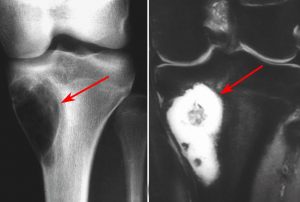Improve the Symptoms of Bone Cancer with Mindfulness
By John M. de Castro, Ph.D.
“in the area of cancer care, the body of research is more robust than in many others, with a number of large well-designed studies and meta-analyses providing consistent and promising results.” – Linda Carlson
Receiving a diagnosis of cancer has a huge impact on most people. Coping with the emotions and stress of a cancer diagnosis is a challenge and there are no simple treatments for these psychological sequelae of cancer diagnosis. But cancer diagnosis is not necessarily a death sentence. Over half of the people diagnosed with cancer are still alive 10 years later and this number is rapidly increasing. It is estimated that 15 million adults and children with a history of cancer are alive in the United States today. But, surviving cancer carries with it a number of problems. “Physical, emotional, and financial hardships often persist for years after diagnosis and treatment. Cancer survivors are also at greater risk for developing second cancers and other health conditions.” National Cancer Survivors Day.
Mindfulness training has been shown to help with cancer recovery and help to alleviate many of the residual physical and psychological symptoms, including stress, sleep disturbance, and anxiety and depression. This has been demonstrated with a large variety of cancers. The Mindfulness-Based Stress Reduction (MBSR) program consists of 8 weekly 2-hour group sessions involving meditation, yoga, body scan, and discussion. In today’s Research News article “Effects of mindfulness-based stress reduction combined with music therapy on pain, anxiety, and sleep quality in patients with osteosarcoma.” (See summary below or view the full text of the study at: https://www.ncbi.nlm.nih.gov/pmc/articles/PMC6899366/), Liu and colleagues study the effectiveness of MBSR for the treatment of the symptoms of osteosarcoma (bone cancer).
They recruited patients diagnosed with osteosarcoma. All patients continued receiving their usual care but half were randomly assigned them to receive an 8-week program of Mindfulness-Based Stress Reduction (MBSR). At the end of each session they listened to music for 30 minutes. They were measured before and after treatment for pain levels, anxiety, and sleep quality.
After treatment the patients who received Mindfulness-Based Stress Reduction (MBSR) plus music therapy reported significantly less pain and anxiety and greater sleep quality. The study did not have an active control group. So, confounding variables such as placebo and Hawthorn effects may have bee responsible for the effects. But prior research has demonstrated that mindfulness training reduces anxiety and pain and improves sleep in a wide variety of patients. So, it is likely that MBSR training was responsible for the benefits seen in the present study.
The study did not investigate the relationship between the relief to the symptoms. But it is reasonable to think that the pain relief may have contributed to the improvement in sleep and the relief of anxiety. Hence, mindfulness training markedly improved some of the residual symptoms remaining after treatment for bone cancer relieving their suffering.
Improve the symptoms of bone cancer with mindfulness.
“mindfulness-based interventions may decrease pain severity, anxiety, and depression and can improve QoL. . . treatment for cancer pain.” – Srisuda Ngamkham
CMCS – Center for Mindfulness and Contemplative Studies
This and other Contemplative Studies posts are also available on Google+ https://plus.google.com/106784388191201299496/posts and on Twitter @MindfulResearch
Study Summary
Liu, H., Gao, X., & Hou, Y. (2019). Effects of mindfulness-based stress reduction combined with music therapy on pain, anxiety, and sleep quality in patients with osteosarcoma. Revista brasileira de psiquiatria (Sao Paulo, Brazil : 1999), 41(6), 540–545. doi:10.1590/1516-4446-2018-0346
Abstract
Objectives:
To evaluate the effects of mindfulness-based stress reduction (MBSR) combined with music therapy (MT) on clinical symptoms in patients with osteosarcoma.
Methods:
Patients diagnosed with osteosarcoma were assessed for eligibility. A total of 101 patients were ultimately randomized into the intervention and control groups. Both groups received routine care. Eight sessions of MBSR and MT psychotherapy were conducted in the intervention group, while the control group received no psychological intervention. Patients were assessed regarding pain, anxiety, and sleep quality at two distinct stages: before and after the intervention.
Results:
There were no significant differences in sociodemographic and clinical parameters between the intervention and control groups at baseline. The intervention program significantly alleviated psychological and physiological complications in patients with osteosarcoma. Specifically, the study revealed that 8 weeks of the combined MBSR/MT intervention effectively reduced pain and anxiety scores and improved the quality of sleep in patients.
Conclusion:
MBSR combined with MT significantly alleviated clinical symptoms, and could be considered a new, effective psychotherapeutic intervention for patients with osteosarcoma.
https://www.ncbi.nlm.nih.gov/pmc/articles/PMC6899366/
